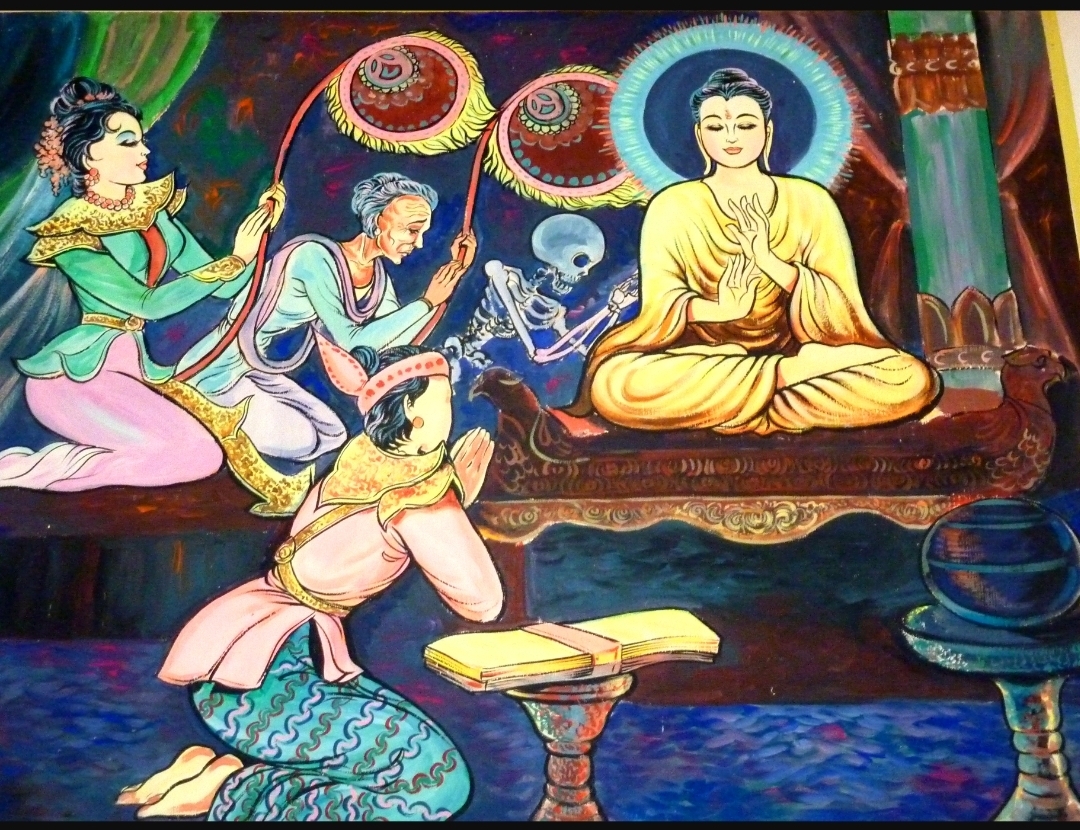Brahmanvagga and Vajrasuci Upanishad: Coincidental Parallels? (Part One)
Who is a Brahmana?
The universally reviled text Manusmriti suggests, in 1.31, that―
With a view to the development of the (three) regions, He brought into existence the Brāhmaṇa, the Kṣatriya, the Vaiśya and the Śūdra, from out of His mouth, arms, thighs and feet (respectively).
(Similar origin myths are mentioned in Buddhist scriptures such as Assalayana Sutta,Kalama Sutta and Ambattha Sutta.)
The very same text, in a later verse, prescribes "teaching, studying, sacrificing and officiating at sacrifices" as some of the obligatory duties of a true Brahmin.
(These duties are remarkably consistent amongst the Puranas and Smritis―a remarkable exception being the unequivocally egalitarian text Bhagavad Geeta, as these verses illustrate.)
A cursory reading of these injunctions would imply that the varnas describe occupations (and hence the duties), and that there is no inherent hierarchy, but this, this, and this paint a radically different picture.
While it can be argued that there are numerous inconsistencies in the Manusmriti and the Anushashan Parva of the Mahabharata, can it be said that the Vishnu Purana is inconsistent or irretrievably doctored? Are we going to make the argument that every Hindu text discussing caste is doctored?
After having read the above paragraphs and analysing the citations, you might have fallen under the impression that Brahminhood was a hereditary occupational "quality" that accorded supremacy to an individual. While not incorrect, you would be wholly mistaken to assume that this was the only doctrine the Sanatana Dharma espoused. To reduce the Eternal Way to mere scriptural injunctions is an error even pathological fools would not commit.
The Brahmana, the Kshatriya,
the Vaishya and the Shudra,
are the four varnas.
What is meant by Brahmana?
Is it his individual soul?
Is it his body?
Is it based on his birth?
Is it his knowledge?
Is it his deeds?
Is it his rites?
(Vajrasuchi Upanishad, verse 2. Citations: Raghunandan 2010; taken directly from Wikipedia).
Does the soul make one a Brahmin?
No, asserts the Vajrasuchi Upanishad (an undated minor Upanishad)―the same indestructible, eternal and immutable soul transmigrates from one body to another (a doctrine expounded in the Taittiriyopanishad, the Brahma Sutra, and the Bhagavad Gita).
While the Brahmanvagga does not refer to an imperishable essence in living entities owing to the Buddhist doctrine of anatta (not-self/no-self), the Buddha preaches that every human body is composed of the four great elements.
Does the body make one a brahmin?
Again, the VU answers in the negative, asserting that since
- The body is composed of the same five elements;
- old age and death, righteousness and unscrupulousness is found in all people;
- All communities and endogamous castes possess individuals of varying colors (in saying so, Vajrasuchi mirrors the Shanti Parva of the Mahabharata);
- the body does not make one a Brahmin.
The Brahmanvagga proclaims that mere appearances do not make one a Brahmin; in verse 394 of the Dhammapada, the Buddha questions the point of matting one's hair and donning the sacred thread when one's mind is defiled with passion and clinging.
Does birth/caste make one a Brahmin?
Nope, states the text, citing the diverse and "seemingly" inferior origins of reputed sages Vyasa (fisherman's daughter's son), Valmiki (from an ant hill), Jambuka (from a jackal), and Agastya (from an earthen-pot). Their birth origins had no bearing on their path to greatness.
Verse 394 of the Dhammapada asserts strongly that birth origins and lineage make no difference to the likelihood of someone attaining Brahminhood. Specifically, the Buddha says:
na jaṭāhi na gottena, na jaccā hoti brāhmaṇo.yamhi saccañca dhammo ca, so sucī so ca brāhmaṇo.
Not by matted hair, nor by lineage, nor by birth does one become a holy man. But he in whom truth and righteousness exist - he is pure, he is a holy man.
It is evident that Buddha associates brahminhood with the purity of the mind and deeds. This view is corroborated in the Vasettha Sutta, a text wherein Buddha alludes to the dismissal of caste as a mental fiction in the Niralamba Upanishad.
Knowledge makes one a Brahmin, I guess?
AGAIN, the text replies in the negative, saying that even among the Kshatriyas (the endogamous warrior class), there are individuals who have read the scriptures and realised the highest truth; how I interpret this is as saying that mere knowledge of the Vedas and Puranas does not make one a Brahmin.
In contrast, the Brahmanvagga maintains that knowledge does indeed make one a Brahmin; it is just that the "knowledge" it refers to here is different from conventional Vedic/scriptural knowledge. It pertains to realizing the three marks of existence (impermanence, nonself and ignorance), the right path (the Noble Eightfold Path), and becoming aware of one's past lives. The Buddha suggests in 423 that awareness of heaven and hell constitute the definition of a Brahmin.
The egalitarian nature of both texts is obvious. While I would shed light on how both define "Brahmin" in a later essay, I feel that my readers should make themselves familiar with this verse:
विद्याविनयसम्पन्ने ब्राह्मणे गवि हस्तिनि |
शुनि चैव श्वपाके च पण्डिता: समदर्शिन: || 18||
vidyā-vinaya-sampanne brāhmaṇe gavi hastini
śhuni chaiva śhva-pāke cha paṇḍitāḥ sama-darśhinaḥ
śhuni chaiva śhva-pāke cha paṇḍitāḥ sama-darśhinaḥ
The truly learned, with the eyes of divine knowledge, see with equal vision a Brahmin, a cow, an elephant, a dog, and a dog-eater.
(Commentary by Swami Mukundananda.)
Talk of egalitarianism!


Some very well researched material.
ReplyDeleteThanks!
DeleteWell known researches
ReplyDelete